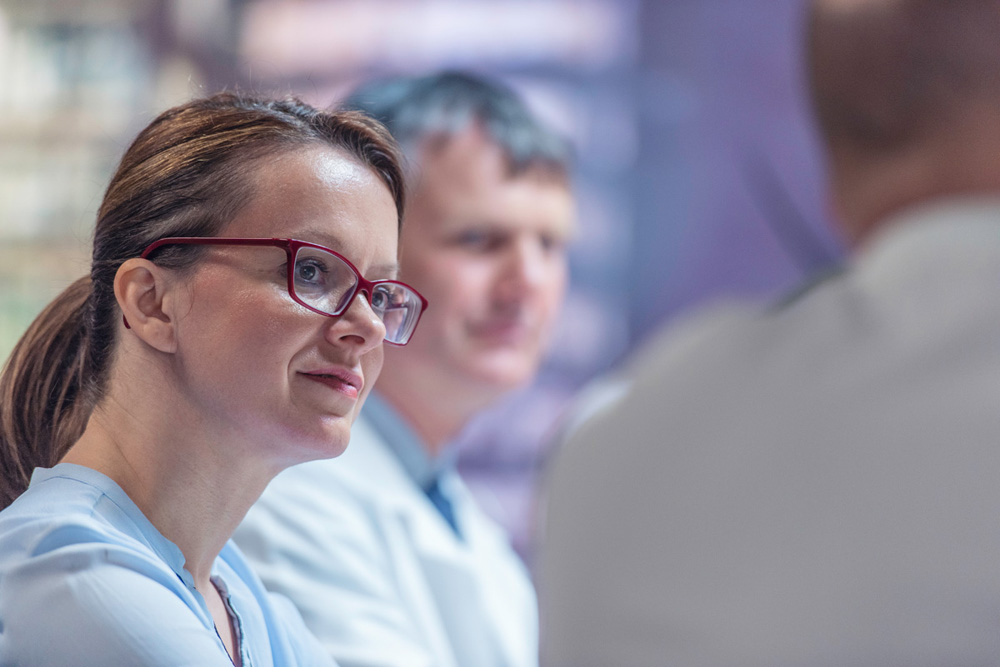- Patients
- COVID-19
Introduction
COVID-19 patient information
Continuing your treatment and keeping you safe
GenesisCare and our doctors remain committed to ensuring that cancer patients can continue to receive the care they need in our centers.
We are closely monitoring the Coronavirus (COVID-19) pandemic, implementing CDC recommendations, and are adding extra precautionary measures to maintain a safe environment for our patients and staff.

Safety first
Keeping our patients and teams safe
Safety first
Keeping our patients and teams safe
- Additional cleaning: Providing safe and clean facilities remains a key focus, and we frequently clean high use areas such as waiting rooms, nursing stations and planning rooms.
- Reinforcing strict hygiene protocols: All employees and guests are asked to practice increased vigilance with hygiene and infection control, with hand sanitizer available throughout our centres, hand washing guides displayed and other reminder notices in centers.
- Pre-visit screening testing: We are screening patients, companions, and visitors for symptoms with a phone assessment and in-center questions on arrival.
- Restricting visitors: Other visitors and caregivers are being asked not to attend our centers, unless required for patient safety and communication.
- Temperature check on arrival: Visitors, including staff and patients, will have their temperature checked.
- Personal protective equipment (PPE): Staff in our centers will wear a surgical mask within the center and will adhere to social distancing where they are not required to be in close contact to deliver clinical care.
- Telehealth: Secure videoconferencing for appointments with your doctor.
Our advice
Our advice to patients visiting our centers
Our advice
Our advice to patients visiting our centers
- Call us if you are ill: Please contact your center prior to treatment if you are experiencing symptoms such as fever and/or shortness of breath or cough.
- Practice good hygiene: Wash hands frequently with soap and water or use hand sanitizer, avoid touching your face, and cover your mouth and nose with a tissue if you must cough or sneeze.
- Attend treatment without guests: We ask that any visitors and caregivers avoid entering our centers during your treatment, unless required for your safety or communication. Our aim is to have your care delivered as promptly as possible, and to the limit the number of people you come into contact with.
- Avoid visits from anyone who is ill: Those affected by cancer disease may be more susceptible to infection, so kindly request that any visitors displaying symptoms of illness, such as elevated temperature, coughing, sneezing or headaches, postpone their visit.
Frequently asked questions
Frequently asked questions
Frequently asked questions
Are you open?
Currently our centers are open and treating patients. We are carefully assessing each patient’s individual risks to ensure we can provide the best care. We are closely monitoring the COVID-19 pandemic, implementing the CDC’s recommendations, and adding extra precautionary measures to maintain a safe environment for our patients and staff.
To keep our patients and staff safe we have implemented the following preventative measures:
- Additional cleaning – providing safe and clean facilities remains a key focus, and we frequently clean high use areas such as toilets, waiting rooms, changing rooms and diagnostic facilities
- Reinforcing strict hygiene protocols –employees and guests are asked to practice increased vigilance with hygiene and infection control, with hand sanitizer available throughout our centers, hand washing guides displayed and other reminder notices in centers
- Pre-visit screening –patients will be screened for virus symptoms with a phone assessment before their appointment and in-center questions on arrival
- Temperature checking – center visitors, including staff and patients, will have their temperature checked on arrival
- Restricting visitors –companions and caregivers are encouraged not to attend our centers if possible, unless required for patient safety or communication
- Waiting areas – we have rearranged our waiting areas to create more space and enable social distancing
- Personal protective equipment (PPE) – staff in our centers will wear a surgical mask within the center to reduce the risk of Coronavirus. Our staff will adhere to social distancing if they are not required to be in close contact with you to deliver your clinical care
- Telehealth – secure videoconferencing for appointments with your doctor
- Emergency response plans – GenesisCare has an emergency response plan in place if a patient and/or employee comes into contact with the virus
I am currently quarantining or isolating, can I still access care?
Yes, even if you’re under quarantine or isolation, we will let you know if you need to attend any ongoing appointments via our Telehealth service.
Can I bring a friend or family member to my appointment still?
To protect our patients, visitors and staff, visitors and caregivers are being asked not to attend our centers, unless required for patient safety or communication.
I have some cold-like symptoms, what should I do?
Please contact your center prior to your appointment if you are experiencing symptoms such as fever or a cough.
How will the coronavirus outbreak affect my ongoing treatment at GenesisCare?
During the COVID-19 outbreak, we are making efforts to ensure that the wellbeing of our patients remains a priority. Currently our centers are continuing to treat patients. We have robust measures in place to ensure your safety when undergoing treatments at our centers. These include:
- Pre-appointment and in-center screening
- Limiting visitors
- Temperature checks on entry to our centers
- No waiting in common areas
- Timed appointments to minimize exposure between patients
- All our staff wear protective masks
Am I at a higher risk of becoming seriously ill if I contract coronavirus, because of my radiation therapy treatment?
Your consultant will advise you on the radiation therapy treatment plan most suitable for you, balancing the benefits and risks of treatment.
Am I in a vulnerable group?
Some people with cancer are more at risk of becoming seriously ill if they contract the COVID-19 infection, including:
- People having chemotherapy, or who have received chemotherapy in the last 3 months
- People having immunotherapy or other continuing antibody treatments for cancer
- People having other targeted cancer treatments which can affect the immune system, such as protein kinase inhibitors
- People having intensive (radical) radiation therapy for lung cancer
- People who have had bone marrow or stem cell transplants in the last 6 months, or who are still taking immunosuppression drugs
- People with some types of blood cancer which damage the immune system, even if they have not needed treatment (for example, chronic leukemia, lymphoma or myeloma)
General Coronavirus FAQs
General Coronavirus FAQs
General Coronavirus FAQs
What is Coronavirus?
COVID-19 (Coronavirus) is a respiratory illness caused by a new virus. Symptoms range from a mild cough to pneumonia. Some people recover easily, others may get very sick very quickly. There is evidence that it spreads from person to person. Good hygiene can prevent infection.
What are the symptoms of Coronavirus?
Symptoms can range from mild illness to pneumonia. Some people will recover easily, and others may get very sick very quickly. People with Coronavirus may experience:
- Fever
- Flu-like symptoms such as coughing, sore throat and fatigue
- Shortness of breath
Other symptoms include vomiting, diarrhoea, indigestion, taste loss, loss of smell and headaches.
Who is most at risk of contracting Coronavirus?
People of all ages can be infected by Coronavirus, however, older people and people with pre-existing health problems (such as asthma, diabetes, heart disease) seem to be more susceptible to becoming severely ill with the virus.
How does Coronavirus impact people with pre-existing health conditions such as cancer and heart disease?
While more than 80% of confirmed COVID-19 cases are considered not severe, the virus has proven to be dangerous, and at times fatal, in immunocompromised individuals, including the sick and elderly.
People with pre-existing health conditions, including cardiovascular disease, cancer or respiratory illnesses such as asthma and COPD, are at higher risk of developing more severe symptoms from Covid-19.
For cancer patients, treatments such as chemotherapy and radiation therapy can weaken their immune system, leaving them more vulnerable to infections like Covid-19.
Similarly, patients with asthma or COPD are often treated with high-dose steroid medication which can also dampen the immune system and put them at increased risk of infection.
How does Coronavirus spread?
There is evidence that the virus spreads from person-to-person. The virus is most likely spread through:
- Close contact with an infectious person
- Contact with droplets from an infected person’s cough or sneeze
- Touching objects or surfaces (like doorknobs or tables) that have cough or sneeze droplets from an infected person, and then touching your mouth or face
What can I do to protect myself?
Everyone should practice good hygiene to protect against infections. Good hygiene includes:
- Washing your hands often with soap and water or hand sanitizer
- Using a tissue and cover your mouth when you cough or sneeze
- Avoiding close contact with others, such as touching
- Avoid touching your eyes, nose and mouth
In addition to the tips above, everyone should follow social distancing:
- Stay at home
- Only go outside for food, health reasons or work (but only if you cannot work from home)
- If you go out, stay (6ft) away from other people at all times
- Wash your hands as soon as you get home
- Do not meet others, even friends or family except people that you live with- you can spread the virus even if you don’t have symptoms
Cancer-related FAQs
Cancer-related FAQs
Cancer-related FAQs
Will I be able to continue my radiation therapy treatment?
GenesisCare remains committed to ensuring that cancer patients can continue to receive the care they need in our centers.
We are closely monitoring the Coronavirus (COVID-19) pandemic, implementing CDC recommendations, and are taking precautionary measures to maintain a safe environment for our teams and patients.
Are GenesisCare oncologists offering Telehealth and how is it done in practice?
We have provided the option to all doctors to offer appointments via Telehealth (secure telephone and videoconferencing) to discuss your treatment options and needs. New or follow-up consultations can be done via Telehealth. We have specialists who can offer Telehealth; please ask them any questions or raise any concerns you may have.
Should people be splitting their radiation therapy and having a break of a couple of weeks before finishing, or is that not advised?
While each case is specific to the patient and therefore a doctor should be consulted in each individual case, we do not typically recommend splitting treatment or taking a break. If you are receiving treatment, we typically recommend you continue your course of treatment, as prescribed, to make sure you receive the best possible health outcome. In some cases, there are some flexibilities built into the treatment plan that would allow delays or changes so we can continue treatment after a break and get the optimal treatment outcome. This will be discussed case by case, and only in the circumstances when you become sick.
What happens if I am having radiation therapy treatment and I contract Coronavirus? Would I have to stop treatment?
Each case is specific to the patient and therefore a doctor should be consulted in each individual case. This depends on the severity of your Coronavirus symptoms. You may be able to continue treatment if you are asymptomatic (not showing any Coronavirus symptoms) and we have precautions in place to provide ongoing treatment safely. If you are not feeling well enough to come for treatment or you are in hospital, we will discuss the best way forward with your consultant. It is likely to involve delaying treatment and compensating for it when you are better, if appropriate.
I am concerned about Coronavirus and putting myself at risk every time I have to travel from home to the center. How can I minimize my risk of Coronavirus while attending my appointments?
We have multiple safety measures in place to protect you and our staff. These include:
- Pre-appointment and in-center screening
- Limiting visitors
- Temperature checks on entry to our centers
- No waiting in common areas
- Timed appointments to minimize exposure between patients
- Our staff wear protective masks
We encourage you to practice good hygiene to protect against infections. Good hygiene includes:
- Washing your hands often with soap and water or hand sanitizer
- Using a tissue and cover your mouth when you cough or sneeze
- Avoiding close contact with others, such as touching, and keep to 6 ft away
Avoid touching your eyes, nose and mouth
Vaccine Reports
Vaccine Reports
Vaccine Reports
* "RIDOH COVID-19 Vaccination Posting- posted in accordance with 216-RICR-20-15-7 Immunization, Testing, and Health Screening for Health Care Workers."
Read next

News Room – What’s been happening
From new centers and technologies to the latest innovations in care, stay on top of what we are doing

Our locations
Across Australia, the UK, the USA and Spain we have over 440 oncology, cardiology & sleep medicine centres.
